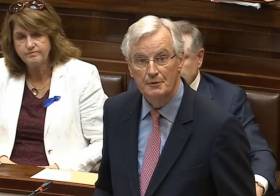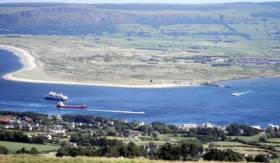Displaying items by tag: Hard Border
#HardAPort- Michel Barnier, the European Union's chief Brexit negotiator says he wants to avoid a "hard border" between the UK and Ireland, reports the Daily Post.
Fears have been raised that Holyhead port on Anglesey, north Wales could suffer if customs checks are brought back between the Republic and the UK.
Mr Barnier today addressed both houses of the Irish parliament on the issue of Brexit with huge concerns in the Republic, particularly on the issue of the border with Northern Ireland.
Labour's Ynys Mon General Election candidate Albert Owen welcomed the comments and said if re-elected he would create a 'Brexit Forum' on Anglesey to highlight potential issues.
Mr Barnier said: "European integration helped to remove borders that once existed on maps and in minds.
"Brexit changes the external borders of the EU. I will work with you to avoid a hard border.
To read more click here.
Could Brexit Bring ‘Port’ Business to Donegal?
#BrexitDonegal - The possibility of utilising harbours in Greencastle or even Buncrana, reports Donegal Now for commercial shipping could yet emerge as one of the unexpected positive consequences of Brexit.
If, as seems increasingly likely, a "hard border" is established, this could mean the reintroduction of customs posts and the imposition of duties on goods passing between Northern Ireland and the Republic.
However, Brexit could open the door for new shipping traffic into Donegal.
The possibility of general cargo using a port like Greencastle was raised this week by Seamus Bovaird of the Greencastle Harbour Users Group.
He floated the possibility that coal and animal feedstuffs could come by ship directly to Donegal.
To read more on this story, click here.

























































